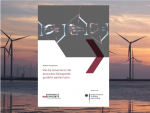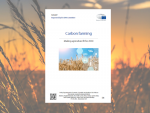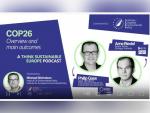Ecologic Institute Newsletter No 231 – December 2021
German climate policy 2022
- Ecologic Institute Newsletter

Climate Protection Year 2022 – After the election is before implementation
Dear Reader,
With the new "traffic light" government assuming office, German climate policy is entering a new phase. To rise to the challenge of the transformation to climate neutrality – and to cross the bar that the coalition parties have set for themselves – the new federal government must tackle a number of issues that were left unresolved under the previous government. The 2020s are the decisive decade for tackling the transformation to climate neutrality and "turning the ship around". In the coalition agreement, this realization is apparent in many areas of action, above all in the accelerated expansion of renewable energies and the accelerated coal phase-out. In other areas, such as transport or CO2 pricing at the national level, there are doubts as to whether the instruments specified in the treaty will suffice to achieve the targets set.
2022 will be a particularly exciting year. The list of projects that the new German government wants to tackle in its first year is dizzyingly long – revising the Climate Protection Act, moving forward the coal phase-out, reforming the system of taxes, levies and surcharges in the energy sector, as well as tightening up a number of climate policy instruments across all sectors.
And at the same time, the architecture of European climate policy is changing rapidly and fundamentally with the Fit for 55 package and the European Green Deal. Here, too, Germany – along with its European partners like France – will have to show leadership. Finally, Germany's upcoming G7 presidency must be used to push for transformative climate policy, also at the international level.
Not only are the necessary changes in our economic system faster and more profound than before – they also take place in a multitude of sectors at the same time. They need to take place simultaneously at several levels, from the international to the municipal level. Keeping this process on track will be a Herculean regulatory task – "politics as usual" is not an option.
Ecologic Institute accompanies the process in many ways – in the research projects Ariadne (BMBF) and 4i-TRACTION (Horizon2020), we address questions of climate change governance and instrumentation. With our work on climate protection laws, long-term strategies and climate protection councils, we develop ideas for specific tools to better manage the Herculean task of transformation, and communicate these ideas to the relevant actors. In the support project to the SINTEG research program and in the Ecornet research network Wissen.Wandel.Berlin, we develop and evaluate proposals for the further development of energy law. Some examples of our work can be found in this newsletter – more will follow in the coming months.
I hope you enjoy reading this newsletter and wish you a good start into the climate protection year 2022,
Benjamin Görlach
Options to Strengthen the Governance of German Climate Policy – Policy Brief
This Ariadne policy brief identifies key problems of the governance of German climate policy, with focus on the federal level and issues of cross-sectoral coordination. It then discusses eight options for solution to improve the allocation of competencies and coordination tasks in government work and strengthen central processes in the climate policy process and the involvement of scientific expertise. The paper was also sent to negotiators of the coalition talks in the run-up to publication. The policy brief of the Copernicus project Ariadne, funded by the German Federal Ministry of Education and Research (BMBF), is available for download.
Carbon Farming – Making agriculture fit for 2030 – Report
As the source of 10% of the EU's greenhouse gas emissions and a major carbon sink, agriculture offers significant potential to mitigate climate change. This on-farm agricultural climate mitigation is referred to as carbon farming. On behalf of the European Parliament, Ecologic Institute with support from IEEP investigate the potential of carbon farming to mitigate emissions in the EU and how to effectively incentivise farmers to act. The report is available to download.
Possible Extension of the EU Emissions Trading System (ETS) to Cover Emissions from Road Transport and Buildings – Report
To meet its increasingly stringent emissions reduction targets, the EU plans to extend the use of emissions trading, to also cover emissions from road transport and buildings. To understand the effects of this move, this comprehensive analysis investigates the economic, social, environmental, and regulatory / administrative implications. A consortium with the participation of Ecologic Institute investigated options for either expanding the EU ETS or creating a stand-alone ETS. It assessed the impacts of the identified options in qualitative and quantitative terms, particularly in terms of effectiveness, of regulatory robustness, as well as distributional effects and potential quantitative impacts on the existing EU ETS and the Effort Sharing Regulation. The report is available for download.
COP26: Overview and Main Outcomes – A Think Sustainable Europe Podcast
A new podcast of the European network of think tanks "Think Sustainable Europe" is discussing the main outcomes of the climate negotiations at COP26 in Glasgow. The climate conference and its outcomes were received with a range between careful optimism and disappointment on the little progress. Following the invitation of the Institute for European Environmental Policy (IEEP), one of Ecologic Institute's climate negotiation experts, Arne Riedel, joined Michael Nicholson (IEEP) and Philip Glas (IISD) for the exchange.
If Oceans Could Speak – A podcast about the sea and its people
Everybody who loves the sea has a story to share. In the podcast "If Oceans Could Speak", scientists and experts from different fields, scholars and sailors, artists and activists share their stories about the oceans around us, their value and vulnerability. This podcast was produced in the EU4Ocean network for "Ocean Literacy" with the participation of Ecologic Institute.
Making the EU Fit for 55 – Discussion
With the Fit for 55 package, the European Commission made far-reaching proposals in July 2021 to align the architecture of European climate policy with the goal of climate neutrality. However, the proposals raise a number of questions – from distributional effects and acceptance to the consistency of the instruments. In November 2021, in the course of this two-day hybrid event, researchers from the Ariadne consortium discussed these issues with stakeholders and decision-makers at the European level. The objectives of the event were to get reactions to (interim) results of the Ariadne work and to better tailor future research to policy needs and the current state of the Brussels debate.
INTERLACE in the New European Bauhaus – Presentation
How can European citizens become architects of the cities of tomorrow? The New European Bauhaus is an initiative to make our living spaces and experiences more beautiful, sustainable and inclusive. Nature–based solutions are seen as a key element to achieve this vision. To this end, the hybrid conference 'LIFE in the New European Bauhaus' was held from 15 to 17 November 2021. Sandra Naumann from the Ecologic Institute was invited as an expert to share insights from the H2020 INTERLACE project. An event recording is available online.
Plastics in the Environment (PlastikNet) – Webinar Series
Plastic waste in cities, in the landscape, in rivers, on beaches, and eventually in the oceans – the presence of plastics in the environment is immediately and negatively visible. Entry pathways into the environment and environmental impacts of plastic are diverse and not always easy to identify. Within the research focus, twenty joint research projects investigate sources and develop and test transdisciplinary solutions. The project results will be presented in webinars until August 2022. Participation in the webinars is free of charge; registration in advance is required.
ENABLE Project Wins the BiodivERsA Award for Excellence and Impact
We are thrilled to announce that the ENABLE project has been awarded the BiodivERsA Prize for Excellence and Impact. This award recognizes the excellent research performed in ENABLE and the impacts that were achieved for both policy and society. As a project partner, Ecologic Institute lead the work assessing the socio-cultural perceptions and preferences of citizens for different forms of green and blue infrastructure and supported the policy and institutional analysis in the project cities as well as the formulation of policy options.
The Role of Think Tanks in Strengthening Sustainability Policies and Governance – An interview with Dr. Camilla Bausch
All over the world, the number of think tanks is growing. They differ greatly regarding their focus areas, their structures and their business models. But what do they have in common, and why are they needed? In an interview with André Martinuzzi of the European Sustainable Development Network (ESDN), Dr. Camilla Bausch (Director of Ecologic Institute) reflects on the role and the objectives of environmental think tanks with respect to some of the most relevant policy fields of our times, including the European Green Deal. The interview is available online.
Ecologic Institute Looks Back on First Year as Member of SDSN Germany
Ecologic Institute looks back on the first anniversary of its membership in the Sustainable Development Solutions Network Germany (SDSN Germany). With its membership, Ecologic Institute aims to strengthen the exchange and cooperation with relevant actors in sustainability policy research and practice in Germany – and thus also to contribute to the UN's 2030 Agenda.
Contents
- Publications
- Options to Strengthen the Governance of German Climate Policy – Policy Brief
- Carbon Farming – Making agriculture fit for 2030 – Report
- Possible Extension of the EU Emissions Trading System (ETS) to Cover Emissions from Road Transport and Buildings – Report
- COP26: Overview and Main Outcomes – A Think Sustainable Europe Podcast
- If Oceans Could Speak – A podcast about the sea and its people
- Presentations and Events
- Making the EU Fit for 55 – Discussion
- INTERLACE in the New European Bauhaus – Presentation
- Plastics in the Environment (PlastikNet) – Webinar Series
- News
- ENABLE Project Wins the BiodivERsA Award for Excellence and Impact
- The Role of Think Tanks in Strengthening Sustainability Policies and Governance – An interview with Dr. Camilla Bausch
- Ecologic Institute Looks Back on First Year as Member of SDSN Germany


